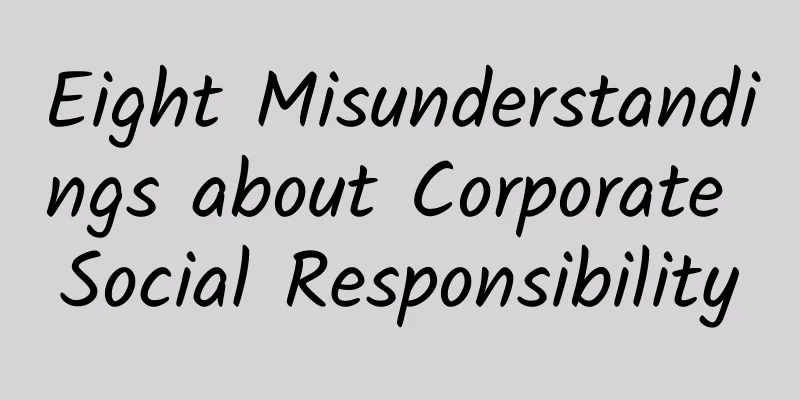Eight Misunderstandings about Corporate Social Responsibility

|
Misconception 1: Corporate social responsibility is SA8000. It is incomplete to confuse corporate social responsibility with standards and equate corporate social responsibility with the International Labor Standards, the Corporate Social Responsibility Code of multinational companies, and the SA8000 Certification. Misconception 2: Taking SA8000 as an international standard SA8000 is a corporate social responsibility certification system led by a non-governmental organization in the United States and claims to be an international standard. As of March this year, there were only 655 companies in the world that passed the SA8000 certification, from 40 countries and regions. However, most of these more than 600 companies are small companies, and only a few companies in developed countries have passed the certification. Misconception 3: Equating corporate social responsibility with enterprises running social affairs The so-called "enterprises running social affairs" means that under the planned economic system, the state regards enterprises as administrative units, and enterprises assume welfare functions for each employee that should have been borne by society. Corporate social responsibility means that under market economy conditions, under the premise that the economic function of enterprises is separated from their social functions, enterprises take the initiative to assume social responsibilities to employees, consumers, the environment and the community in a purposeful and planned manner, so as to achieve a win-win situation for corporate interests and social development. Misconception 4: Thinking that corporate social responsibility is the business of the enterprise itself and has nothing to do with the government. Corporate social responsibility is not entirely the business of the enterprise itself, but a broadly defined issue that transcends legal concepts. Maintaining the normal order of an economic system cannot rely solely on the self-consciousness of enterprises, but should be based on laws and rules. At present, many Chinese companies have a weak sense of social responsibility, which is not only related to the quality of some entrepreneurs, but more importantly, the relevant functional departments have not assumed the corresponding regulatory responsibilities. In recent years, my country has formulated a large number of industry norms, but the core problem is that a sound legal regulatory mechanism has not been formed and established, resulting in a lack of effective connection and checks and balances between government legislation and citizens' compliance with the law, and the fulfillment of corporate social responsibility has naturally become an empty talk. |
<<: The difference between SEARS and K-MART factory inspections and regular factory inspections
>>: 6 Misunderstandings of Customers in Factory Inspection
Recommend
Key requirements for GMP factory inspection
Key requirements for GMP factory inspection 1. Wa...
Indiegogo - One of the First Crowdfunding Sites
What is Indiegogo? Indiegogo is one of the first ...
What is NAFTA? What are the impacts of NAFTA?
What is NAFTA? The North American Free Trade Agree...
KUL--UAE + Saudi Arabia "affordable e-commerce platform"
What is KUL? KUL is adopting a similar model to D...
Is carbon trading the buying and selling of carbon?
What are carbon credits? Carbon credits, also kno...
What is Google Webmaster? What functions does Google Webmaster have?
If you want to see how the latest website ranks, ...
ShopGo--"Shopify in the Middle East"
ShopGo is a local e-commerce service system in th...
Jiangsu Province Wage Payment Regulations
(Adopted at the 12th Session of the Standing Comm...
EICC Certification Reminders Information on Identifying Child Labor Issues
During the summer vacation season, the efforts to ...
Differences between SA8000 and ICTI
It can be said that ICTI and SA8000 are the two h...
What is GlobePay? How does GlobePay work?
What is GlobePay? GlobePay is not only a cross-bo...
eBay Super Topic Ranking: Review Management: "What should I do if I receive a negative review during delivery?"
Most transactions on eBay go very smoothly, and m...
InstaSize—The easiest way to create high-definition pictures and videos
What is InstaSize? InstaSize is an application th...
What are the advantages of bestseller factory audit?
What are the advantages of bestseller factory aud...
eBay's 2019 Fall Seller Update is officially released, including seller tools, inventory optimization, seller protection...
eBay recently announced its Fall 2019 Seller Upda...









